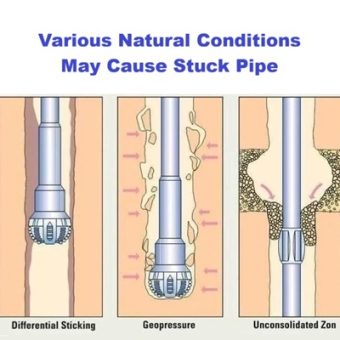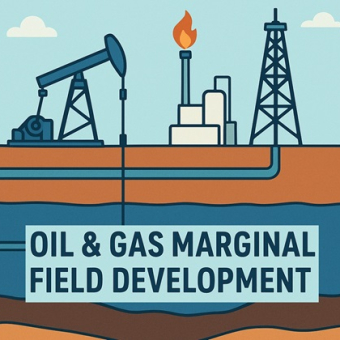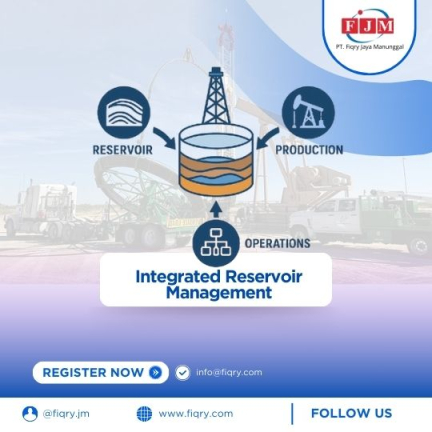- Selamat datang di website PT Fiqry Jaya Manunggal. Semoga anda senantiasa sehat afiat. Kami siap melayani anda
Integrated Reservoir Management
| Stok | Tersedia |
| Kategori | Oil & Gas |
Integrated Reservoir Management
Background:
Integrated Reservoir Management (IRM) is a structured approach to maximize the value of hydrocarbon assets by combining G&G, Reservoir Engineering, Drilling, Completion, Production, and Economic considerations into a single framework. Through effective integration of data and disciplines, operators can improve recovery factors, extend field life, and optimize development plans. This is where “Integrated” play crucial roles.
In practice, however, many engineers tend to focus narrowly on their own disciplines. For example, Production and Completion Engineers often prioritize well deliverability without paying sufficient attention to reservoir behavior, while geoscientists may overlook operational constraints. These siloed approaches lead to inefficiencies, missed opportunities, and suboptimal recovery. A proper IRM program helps overcome these bad habits by fostering collaboration, aligning objectives, and ensuring every decision accounts for both well performance and reservoir sustainability.
Objectives:
- Understand the principles and importance of integrated reservoir management
- Recognize the risks of siloed decision-making and the value of cross-disciplinary collaboration
- Strengthening Production & Operations involvement in reservoir management
- Apply multidisciplinary approaches to reservoir characterization and development
- Evaluate production performance and identify opportunities for reservoir optimization
- Develop reservoir surveillance programs and integrate monitoring data
- Apply enhanced oil recovery (EOR) and improved oil recovery (IOR) strategies.
- Build effective collaboration between geoscience, engineering, and operations teams.
Recommended Participants:
- Reservoir Engineers
- Geologists and Geophysicists
- Production and Petroleum Engineers
- Drilling and Completion Engineers
- Field Development Planners
- Decision Makers in Reservoir Development
Course Outline:
1. Introduction to Integrated Reservoir Management
- Definition, scope, and objectives of IRM
- Common bad habits: “my wells vs. your reservoir” mindset
- Why integration matters for maximizing recovery
2. Reservoir Characterization
- G&G data integration and Petrophysical evaluation
- Reservoir modeling fundamentals
3. Reservoir Engineering Fundamentals
- Material balance and decline curve analysis
- Fluid flow in porous media
- Drive mechanisms and recovery factors
4. Collaboration with Production & Operations Team in Reservoir Surveillance
- Role of Production and Operations
- Daily well monitoring and field reporting as surveillance inputs
- Building cross-disciplinary awareness between reservoir and Operations
5. Production Data and Performance Evaluation
- Well performance analysis & reservoir pressure data
- Identifying production bottlenecks
- Bridging production/well focus with reservoir sustainability
6. Reservoir Surveillance and Monitoring
- Tools and techniques for surveillance
- Production logging, pressure monitoring, tracer methods
- Integrating real-time data for decision making
7. Reservoir Management Strategies
- Primary, secondary, and tertiary recovery methods
- Waterflooding and gas injection strategies
- IOR/EOR project screening and evaluation
8. Field Development Planning
- Reservoir simulation for forecasting and planning
- Well placement and infill drilling strategies
- Balancing short-term production goals with long-term recovery
9. Risk Management in Reservoir Development
- Identifying and mitigating uncertainties
- Sensitivity analysis and scenario planning
- Cross-disciplinary decision-making
10. Case Studies and Best Practices in IRM
- Lessons learned from siloed vs. integrated approaches
- How poor coordination wastes reservoir potential
- Group discussion and application exercise
About The Course Leader:
FJM’s Asscociate Instructors – Practitioner & Trainer
Integrated Reservoir Management

PTK 007 Revisi 05
BACKGROUND: PTK 007 Revisi 05 adalah versi terkini sebagai Pedoman Pelaksanaan Pengadaan Barang dan Jasa Di Industri Hulu Minyak dan Gas Bumi Indonesia. Cost Recovery manjadi salah satu target yang harus dipenuhi dalam bisnis migas di Indonesia. Salah satu syarat agar biaya yang dikeluarkan dapat disetujui sebagai biaya operasi yang dapat cost recovery adalah dengan…
Rp 14.950.000
Advance Project Economics & Risk Analysis Strategic Planning & Portfolio Management of Oil and Gas Upstream Business in Indonesia
BACKGROUND: The oil and gas industry in Indonesia is navigating a transformative period, characterized by evolving regulatory frameworks, advancing technologies, and shifting market dynamics. As the country aims to enhance its energy security and sustainability, the role of advanced project economics and risk analysis has become increasingly crucial. Understanding the intricacies of Production Sharing Contracts…
Rp 14.500.000
Stuck Pipe Prevention
Background: Stuck pipe is one of the most critical and costly problems in drilling operations across the Oil & Gas and Geothermal industries. With more complex well trajectories, smaller hole sizes, and an industry push to “drill to the limit,” the risk of stuck pipe incidents has grown significantly. Although rigs are now supported by…
*Harga Hubungi CS
Drilling & Completion Well Integrity
BACKGROUND: Well Integrity adalah penerapan teknis, operasional dan solusi secara terorganisasi untuk mengurangi resiko tidak terkendalinya siklus kehidupan suatu sumur migas dan menciptakan kondisi operasional yang optimum. Beberapa pengaruh dalam melakukan hal ini adalah kondisi sumur, kondisi lingkungan, dan kondisi peralatan yang dirancang dengan baik. Pemahaman secara advanced dari masalah Well Integrity, setidaknya harus mencakup…
Rp 14.950.000
Marginal Fields Development
Background: Marginal fields development refers to discoveries which have not been exploited for long, due to one or more of the following factors: • Very small sizes of reserves/pool to the extent of not being economically viable • Lack of infrastructure in the vicinity and profitable consumers • Prohibitive development costs, fiscal levies and or…
*Harga Hubungi CS
Gas Development and Commercialization
BACKGROUND: Natural gas has become an increasingly important energy source. Successful Gas Development and Commercialization demands careful integration of technical, economic, regulatory, and commercial considerations to ensure profitability and sustainability. Not only a cleaner alternative to coal and oil but also as a strategic commodity in the global energy market. Developing gas field requires a…
Rp 7.950.000
